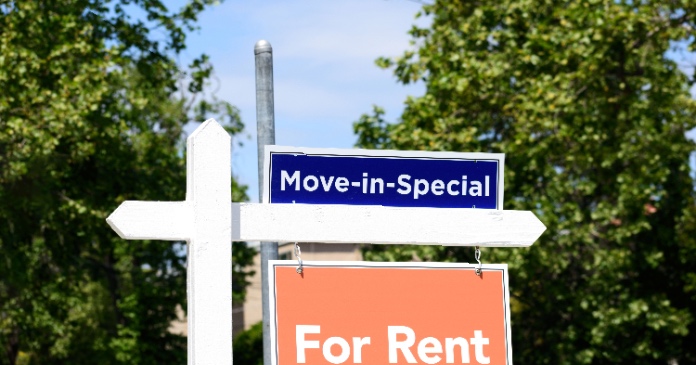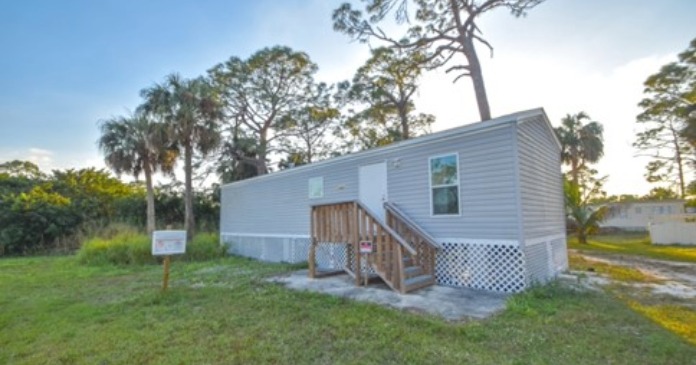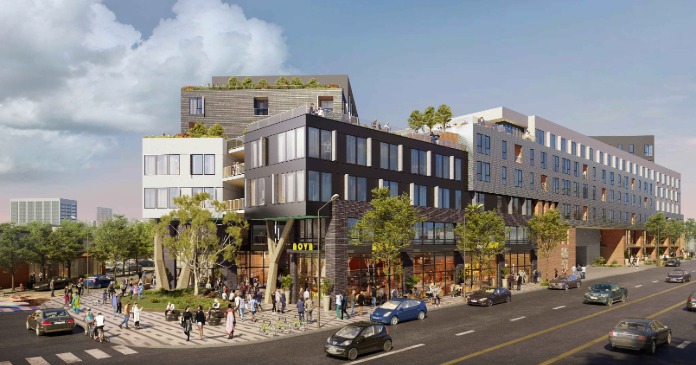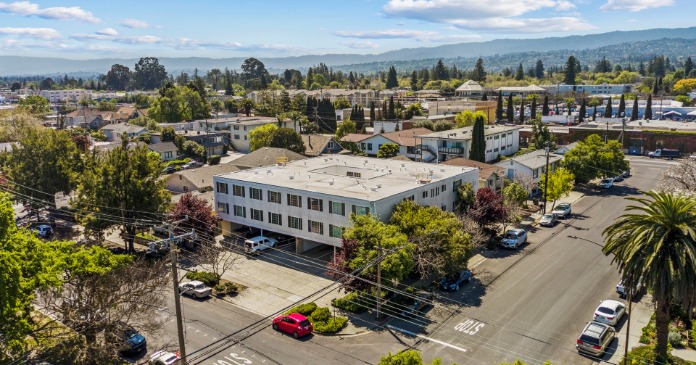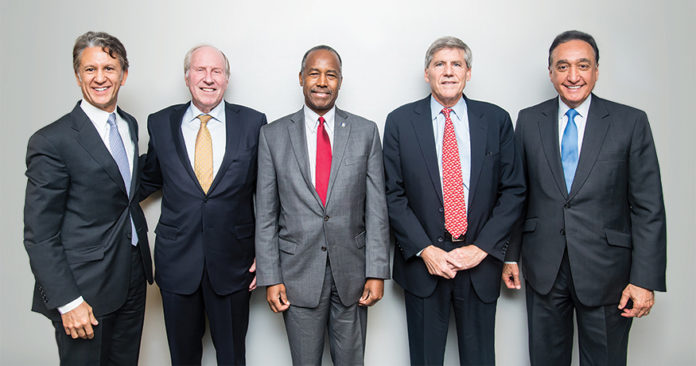
On November 15, 2017, Dr. Ben Carson, Secretary of HUD, gave the keynote address at the Housing America’s Families Forum hosted by the J. Ronald Terwilliger Foundation at the Renaissance Center in Detroit, Mich. The annual event is held to shine a light on the nation’s dire need for affordable housing.
Sec. Carson began by acknowledging the challenges facing the U.S. housing market today. He pointed to the 11 million households in America who are defined as severely rent burdened in that they pay more than 50 percent of their income on rent. He highlighted the fact that more than half a million people, including 40,000 veterans, have struggled with homelessness during the year.
“You recognize that it is a tragedy that a nation as prosperous as ours should see anyone forced to sleep on its streets, or sacrifice necessities to pay their rent” he said.
He praised HUD veterans for the support that they gave him early in his tenure, before his team was in place, and for their resolve in working with him to help solve America’s housing problems, even if their beliefs differ from his.
“They know that safe, fair, and affordable housing is of fundamental importance to everyone. Not just as a matter of shelter, but as a strong foundation for human flourishing, whether in education, health, or economic mobility.”
Sec. Carson declared that the Federal Government cannot address all of these challenges on its own. He called for the involvement of elements of the civil society, including churches, non-profits, charities, fraternal organizations, businesses and families to address the full range of human need.
“We must engage the genius and leadership of private enterprise and local authorities. They are most connected to the people we serve, and can often be extremely effective.”
The secretary sees the Low-Income Housing Tax Credit (LIHTC) and Rental Assistance Demonstration (RAD) as successful examples of government programs that leverage private investment to build, maintain or improve affordable housing.
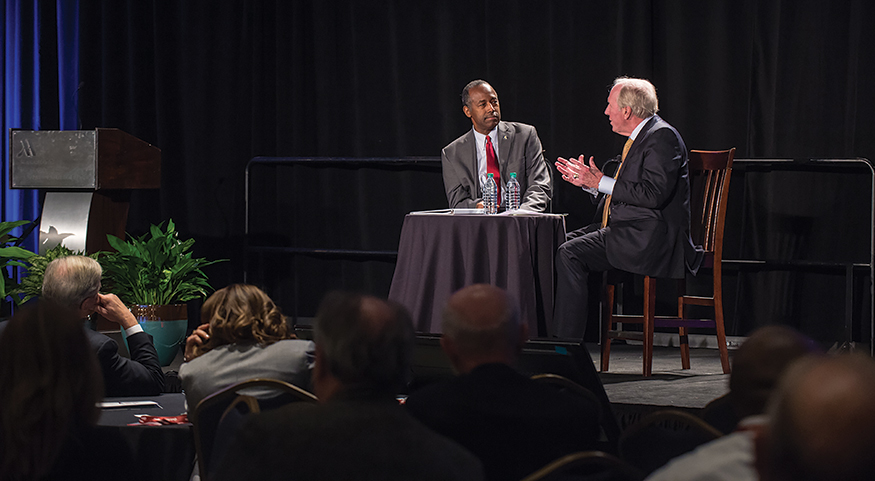
Reframing focus
Developing human capital was also a large part of his message. “What must we do to develop people so that they don’t necessarily need assistance?” adding that he felt it should be a major priority for the government. He feels strongly about structuring assistance programs so as not to create disincentives for those who struggle to elevate their financial footing.
“Homeownership and renting are complimentary elements of our housing system,” said Carson while highlighting new HUD regulations enabling the Federal Housing Authority to make it easier for first time homebuyers to purchase condominiums. He sees condo ownership as the first step on the homeownership ladder for many people.
Still, he cautioned that the first-time buyers must be ready for all that goes into ownership. “If you put someone into a home that they cannot afford, you’re not really doing them any favors,” he said in warning against repeating mistakes of the past.
HUD is reviewing a program whereby a portion of the resident’s rental assistance payment is escrowed and earmarked for routine property maintenance and repairs. If the property remains in good condition and doesn’t require such maintenance, (the thought is the resident would handle routine maintenance) those funds would be available to the resident for a down payment when he leaves assisted housing. Such a program would encourage residents to “start thinking more like homeowners.”
Carson seeks to reframe the opportunities provided low-income residents in order to nurture potential. This long-view perspective sets in motion a mind-set with a goal post: “they start thinking about what is going to happen in a year, or 5 years, or 10 years. And they are much more likely to take advantage of educational programs and training programs. It is really a matter of helping to change the mindset…”
Sec. Carson pointed to two new HUD initiatives. The first is the creation of “EnVision Centers” whose mission is to empower Americans to self-sufficiency.
“They will be hubs of educational opportunities, counseling, and childcare” he said, as well as mentoring at-risk children. With these centers Sec. Carson hopes to break the cycle of dependency with the creation of real economic opportunities. The structure would include partnership “opportunities for the private sector to engage with the government in providing the kind of environment that will actually nurture and develop our people.”
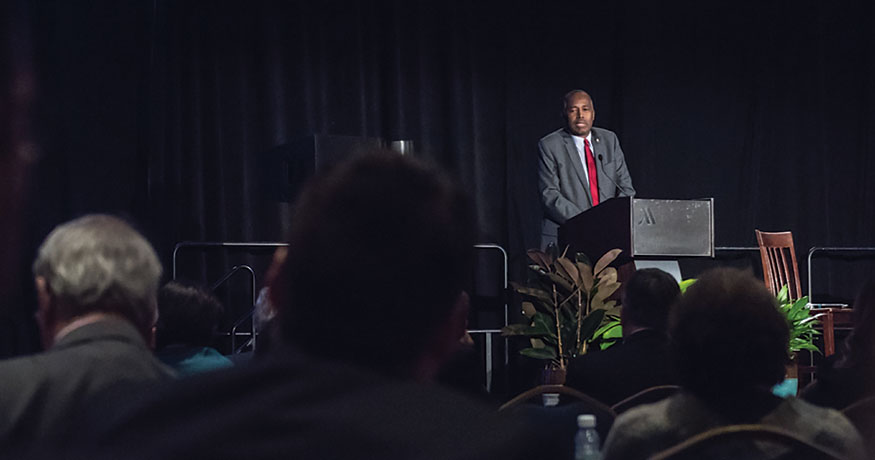
Creating opportunity
Then there is HUD’s Regulatory Reform Task Force “charged with identifying agency regulations that should be repealed, replaced or modified.” On this Sec. Carson is deliberate: “We want our partners in affordable housing to be free to innovate, renew, and give back to their communities.”
Sec. Carson ended with the positive economic statistics generated by the economy resulting in more jobs and development. He cautioned, however, that “as advocates for affordable housing, our challenge for 2018 is to keep this momentum going and to make sure the benefits are shared by all Americans, including the most vulnerable of us. Our nation’s prosperity is only worth bragging about if it includes everybody.”
Sec. Carson is distressed that only 1 in 4 families needing affordable housing today receive assistance. Still he is inspired by the emergence of public-private partnerships working to address the issue. This not only addresses the issue, but creates awareness and “an investment by the local community in what’s going on and that it is maintained.”
Cultivating strength
Another issue on the Secretary’s radar is residents in public housing staying long term and creating a backlog of people waiting for assistance. “We really need to concentrate on how do we move people forward,” he said. “Our success is not how many people we get into public housing but rather how many we get out of it.” Developing all of our people will be critical to competing with India and China in productivity and otherwise.
Ron Terwilliger asked how the Secretary to ensure that tax reform has a positive outcome for housing and why housing is not discussed more often in the political arena. Sec. Carson suggested that it is driven by politics. Congress responds to the issues raised by voters. Housing advocates need to make their voices heard. As long as homeowners outnumber renters and vote at higher rates, Congress will focus there.
Moving beyond politics was a sticking point for Sec. Carson. Inferring dignity to those in need the utmost priority. “We need a vision for how we perpetuate a strong society and how we make that society even stronger. We are not going to do that if we have an increasing number of people becoming dependent and not being developed. When we begin to think that way, attention will begin to shift.”
Update – Secretary Carson’s agenda:
Accomplishments in 2017
- We Strengthened the FHA Fund to Protect Taxpayers
- Suspended Premium Reduction – The Federal Housing Administration announced it was suspending a mortgage insurance premium reduction, ensuring it would continue to meet its statutory 2 percent capital requirement minimum and protect taxpayers by avoiding another taxpayer-funded bailout.
- Ended Insurance for new Property-Assessed Clean Energy (PACE) Loans – FHA will no longer insure PACE loans.
- Reformed HECM – HUD strengthened Home Equity Conversion Mortgage (HECM) or ‘reverse mortgage’ program by putting limits on how much seniors can borrow in order to improve the program’s financial health and ensure that it remains a resource for senior borrowers.
- We Protected Veterans from Abusive Mortgage Loan Churning – Working with VA, Ginnie Mae has taken decisive action to address abusive loans, and further actions are planned that will take effect shortly.
- We played a vital role in Hurricane Disaster Response – HUD announced a package of 19 regulatory and administrative waivers aimed at helping communities to accelerate their recovery from Hurricanes Harvey, Irma and Maria. Additionally, we have made several mortgage relief services and programs available to homeowners in Presidentially declared disaster areas.
Looking Forward:
- We plan to start several EnVision Centers around the nation.
- Continue Disaster Recovery and Relief Efforts
- We’re going to continue to Reduce Homelessness – HUD is committed to working with our federal, state, and local partners to end homelessness. We need to build on tested strategies by strengthening interagency collaboration, promoting self-sufficiency in all our programs, bolstering an economy that creates jobs for all Americans, and investing in proven approaches, like Housing First.
- We’re going to Empower Section III – Section 3 has been on the books for more than 40 years, but it is rarely utilized to its full potential. Section 3 can be a way for Americans to reach self-sufficiency. In the coming year HUD is focused on empowering Section 3 so more residents of HUD-assisted households are able to take advantage of the program and achieve their American Dream.



